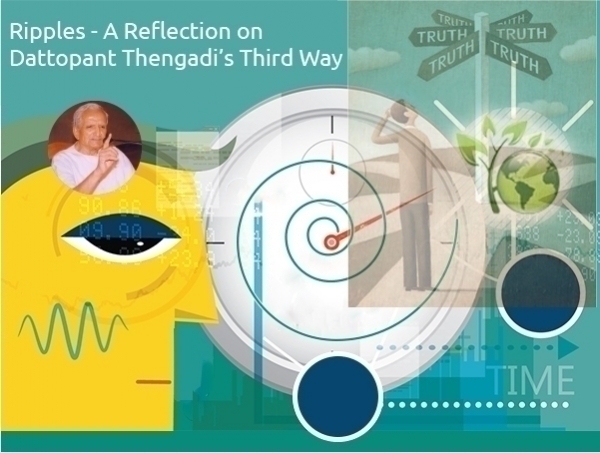Ripples A Reflection On Dattopant Thengadi's Third Way - Part 38
14 Jun 2022 11:03:05
I have been reflecting in my own way on Dattopant Thengadi Ji's Third Way. I present these small "ripples" that it has caused in my mind in a series. I am glad it has found its resonance in many thinking minds alike. I hope the readers have read the earlier article in the series before moving ahead.

Also Read: Ripples A Reflection On Dattopant Thengadi's Third Way - Part 37
Dattopant stated that Buddha maintained that if all republic institutions were intact even small states would be invincible. If the original thought is referred to, Dharma has greater importance than the king. The religious,ethical,social, political, juridical, and customary laws based on Dharma were to govern life of all.
The king's role was of a 'guardian, executor and a servant of Dharma' who was entrusted with the responsibility of preventing breaches and irregularities. The king too ought to obey the Dharma rigorously. Dharma was the actual sovereign leaving no space for oppression, cruelty or tyranny. Obedience of the king was not binding if he doesn't follow Dharma. Even eliminating such ruler was probably justified. The king was not described as an unconditional Devine.
Monarchy was not the only form of government available. Many forms of government could be conceived. Even in the later stage shaping of the institutions was not left to politicians. Gradually collective wisdom worked and helped developing systems.
Rigid uniformity was not sought after, sufficient flexibility was the reality. The systems that could not survive the test of time and need, gradually discontinued from use. The systems that were in tune with the our changing needs could flourish.
The systems evolved naturally. Natural order of life was not substituted by a different order disturbing the complex social phenomenon.
Even individuals were expected to follow their duty shaped by their role and stage of life. Society was an organic whole where everyone had a unique but a complex role or a set of duties( swadharma ). This could sustain and preserve any society. Every aspect of life even the relation with other individuals or system is covered by the concept of swadharma. It was the duty of every one to follow one's duty, without it being imposed by the state.
In a way there was a freedom and self determination in this process. All the instructions and systems had their own laws but they were ultimately in coherence with the greater whole. The State was a coordinating authority and excercised control to an extent. It was not treated to be the supreme authority. The State was maintained and restrained by Dharma.
Shri Guruji and Deendayal Ji used the expression, 'the State without statism'. It implies the Hindu social order,it encompasses the entire world. The western world might take some to understand it , in its real sense.

Also Read: Ripples A Reflection On Dattopant Thengadi's Third Way - Part 37
Dattopant stated that Buddha maintained that if all republic institutions were intact even small states would be invincible. If the original thought is referred to, Dharma has greater importance than the king. The religious,ethical,social, political, juridical, and customary laws based on Dharma were to govern life of all.
The king's role was of a 'guardian, executor and a servant of Dharma' who was entrusted with the responsibility of preventing breaches and irregularities. The king too ought to obey the Dharma rigorously. Dharma was the actual sovereign leaving no space for oppression, cruelty or tyranny. Obedience of the king was not binding if he doesn't follow Dharma. Even eliminating such ruler was probably justified. The king was not described as an unconditional Devine.
Monarchy was not the only form of government available. Many forms of government could be conceived. Even in the later stage shaping of the institutions was not left to politicians. Gradually collective wisdom worked and helped developing systems.
Rigid uniformity was not sought after, sufficient flexibility was the reality. The systems that could not survive the test of time and need, gradually discontinued from use. The systems that were in tune with the our changing needs could flourish.
The systems evolved naturally. Natural order of life was not substituted by a different order disturbing the complex social phenomenon.
Even individuals were expected to follow their duty shaped by their role and stage of life. Society was an organic whole where everyone had a unique but a complex role or a set of duties( swadharma ). This could sustain and preserve any society. Every aspect of life even the relation with other individuals or system is covered by the concept of swadharma. It was the duty of every one to follow one's duty, without it being imposed by the state.
In a way there was a freedom and self determination in this process. All the instructions and systems had their own laws but they were ultimately in coherence with the greater whole. The State was a coordinating authority and excercised control to an extent. It was not treated to be the supreme authority. The State was maintained and restrained by Dharma.
Shri Guruji and Deendayal Ji used the expression, 'the State without statism'. It implies the Hindu social order,it encompasses the entire world. The western world might take some to understand it , in its real sense.
